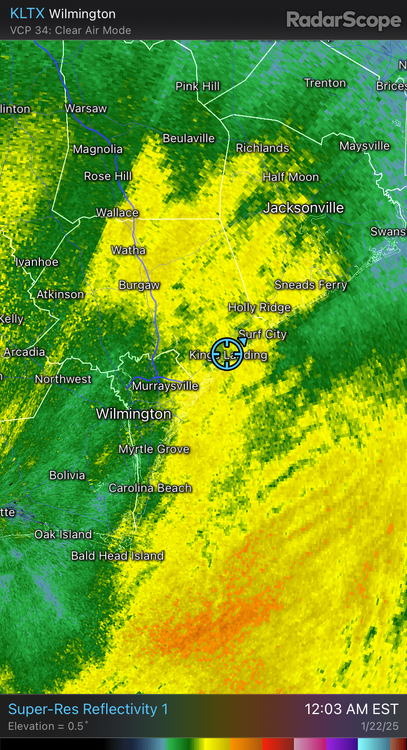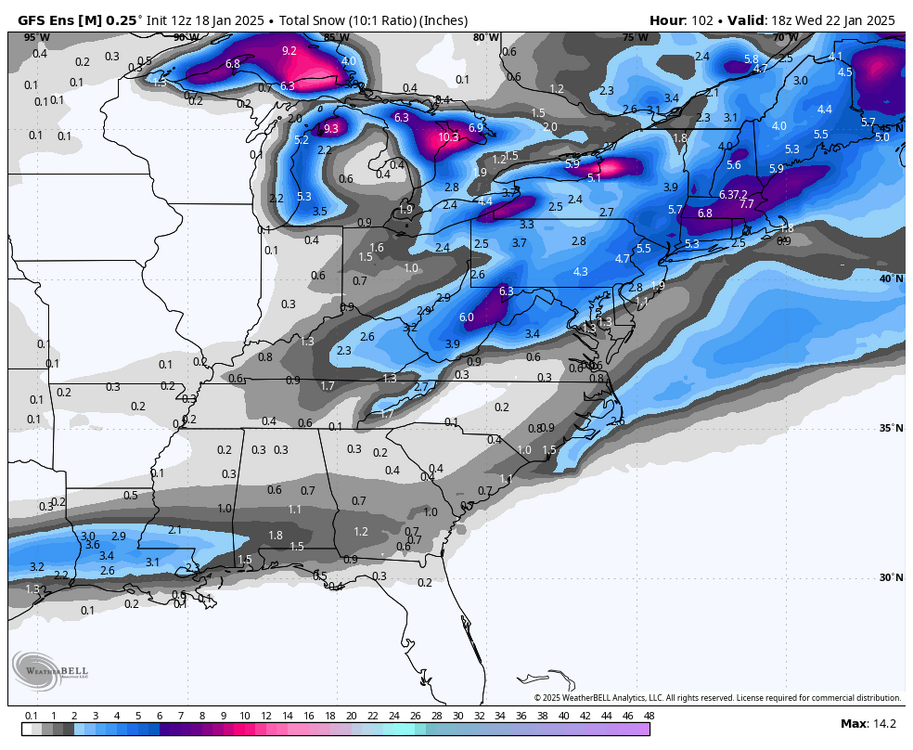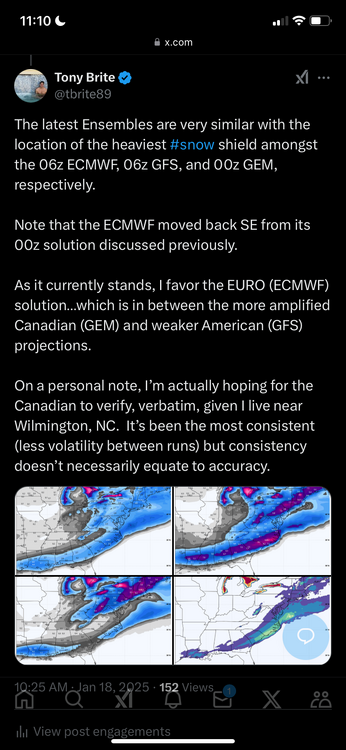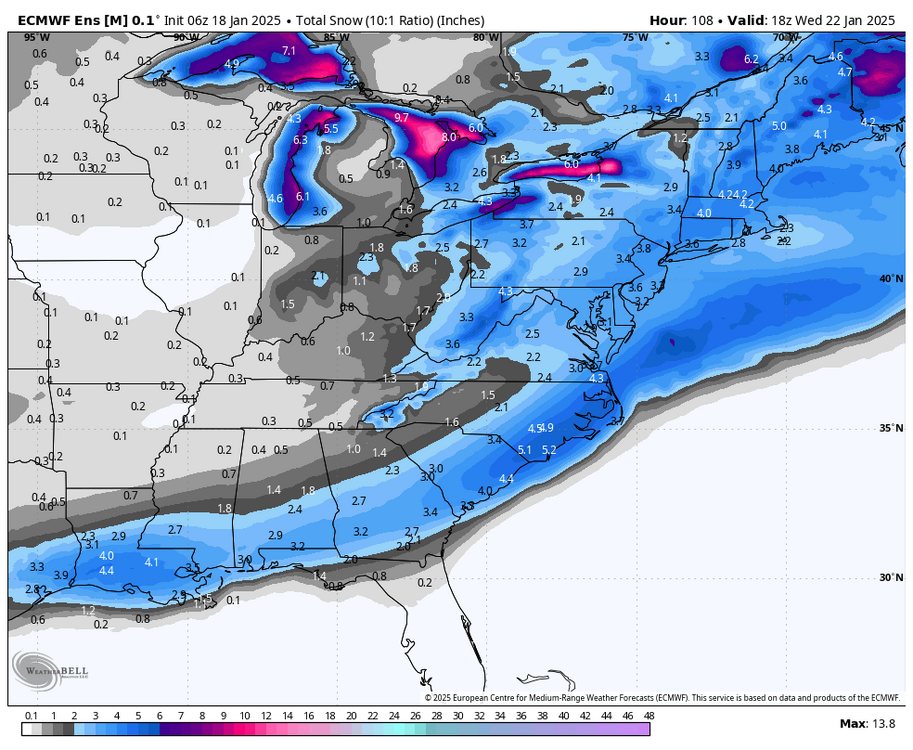-
Posts
1,191 -
Joined
-
Last visited
About ncforecaster89

- Birthday 05/03/1970
Profile Information
-
Four Letter Airport Code For Weather Obs (Such as KDCA)
KILM
-
Gender
Male
-
Location:
Wilmington, NC
-
Interests
Hurricanes and blizzards are my primary interests relative to a specific atmospheric phenomenon. Tropical meteorology was, and has been, my focus since my first hurricane experience at the impressionable age of 14. It was this fateful encounter that led me to pursue a degree in atmospheric sciences. While in college, I was most fortunate to have interned at the NHC (by way of a student internship) with the late Bob Case as a mentor. Although I no longer work in the meterological field professionally, I still enjoy helping others by sharing the knowledge others have so generously given me. Thus, one is most likely to see the vast majority of my posts being centered on tropical meterology.
Recent Profile Visitors
5,594 profile views
-

1/21-1/22 Winter Storm OBS Thread
ncforecaster89 replied to metalicwx367's topic in Southeastern States
That’s what’s occurring just N of Wilmington, in Hampstead. Sleet coming down extremely hard; wasting serious snow amounts. -

1/21-1/22 Winter Storm OBS Thread
ncforecaster89 replied to metalicwx367's topic in Southeastern States
It’ll take 6.5” at Wilmington to become a top 10 event. The record is 15.3” on 12/22-24/1989. -
To be fair, the advancement in computer processing power/modeling has dramatically improved our forecast accuracy, by an incalculable margin. The larger issues relate to both too much public accessibility to long range modeling (and the misuse, thereof) and poor messaging. In this social media age, too many content creators (or what I like to call socialmediarologists) are most interested in engagement farming and it hurts the integrity of the science and trust within the general public, at large. In addition, most don’t truly comprehend/appreciate the immense complexities involved with attempting to predict the weather, accurately, at even the short range. The truth of the matter is that it will always be an inexact science…yet it’s truly amazing how much progress has been made within just the past 30 years. I’ll conclude by stating that not a one of us meteorologists could consistently outperform the more reliable models…which is why we have them in the first place.
-
Bad sign to be honest and is likely a direct result of the aforementioned ingestion of actual in-situ data. It’s not too unusual to see such adjustments in the 60-84 hour range for that very reason. Hence, why I stated we’ve entered the critical 24 hour period for potential significant adjustments and usually a greater consensus amongst the deterministic guidance. Being that I live near Wilmington, NC, I’m going to take that “drink” @calculus1offered a few minutes ago!
-
Not necessary. But thanks anyway. I’ve been doing this for more than 30 years. As such, I know better than to put too much emphasis on any particular solution at these ranges. I was making an objective factual statement that we are just now entering the critical 24 hour period where the respective deterministic guidance typically builds a greater consensus because of the influx of actual in-situ data via sampling of the energy out W.
-
We’re still a relatively long ways out to be forecasting precise snowfall amounts. That said, I’d go with 2-4” for Wilmington, NC at this particular time. Should begin to see an ever-growing model consensus during the next 24 hours as the energy gets better sampled by the sondes.
-
Looking at the NAM beyond 48 hours is fools gold. The same applies to the Kuchera snow maps. If you want best accuracy, use 10:1 around here.
-
Suppression will cause depression
-
-
There is a pretty good consensus, currently, with regard to forecast track progression of the low and corresponding area of heaviest snow shield…as can be seen below. Still ample time to change, obviously.
-
-
I saw 8” on the Outer Banks in a middle January winter storm in 2018. Also, it was accompanied by thundersnow and 30 mph wind gusts at Kitty Hawk. Nothing like that since on the Outer Banks.
-
I respectfully disagree, the same synoptic pattern can still produce a 1989 redux. It’s a rare event for a reason, but it’s happened before and you can be certain it will happen again. Could be next week or 50 years from now, but the climate hasn’t changed that remarkably nor will it.
-
Quick off-topic question: Is WeatherBell that much better than Weather Models? I just purchased access to the latter this evening based on a few others preference for it. I really like the looks of these WxBell graphics you’re posting.
-
Me, too! But, I’m not looking at any deterministic runs until we’re inside 186 hours and even then, we need to be within 96 hours to really trust the signal. Still a long ways to go. That said, it’s better to see something at 200 hours than nothing at all. Just trying to keep things in their proper perspective.




.thumb.png.991e09c19c25af7391ed569a205a5136.png)








